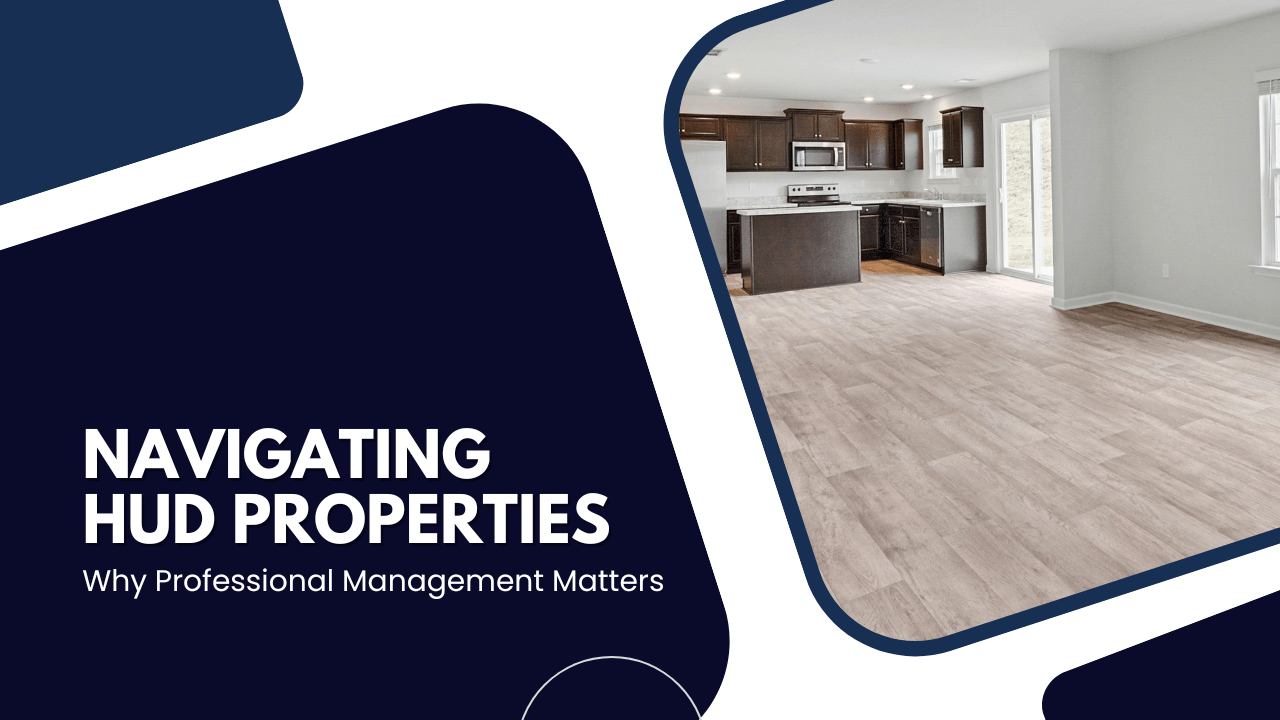As most local and out-of-state investors know, owning rental property in California comes with both opportunity and complexity. There’s a lot of potential for profit, both in the short term and the long term. At the same time, there are legal regulations and tenant protections to navigate. Natural disasters are always a risk.
There’s also extra care that needs to be taken when rental property owners are dealing with HUD (U.S. Department of Housing and Urban Development) properties. HUD programs have become more important than ever in California. With affordable housing scant, these homes are a lifeline for qualified tenants who struggle to meet the market-based rents in most California cities.
There’s a benefit to owners, too. These homes offer a way to secure long-term tenants and steady rental income. Many owners find that they enjoy extra stability when it comes to their Section 8 tenants and rental payments. However, these types of properties are also likely to introduce unique layers of compliance, inspection requirements, tenant eligibility guidelines, and bureaucratic communication.
For property owners, managing these intricacies without professional help can become overwhelming and potentially costly.
Bell Properties can be a property owner’s secret weapon when it comes to working with government agencies and tenants who receive HUD benefits. We know these programs, we’ve effectively navigated the extra requirements that come with them, and we’ve had effective and excellent experiences with owners and with tenants.
Because we’re so often asked about renting HUD properties, we decided to put together some of our best advice. Let’s explore what HUD properties are, the challenges California rental owners face in managing them, and why partnering with a professional property management firm like ours is essential to have a pleasant and profitable rental experience.
What Are HUD Properties?

Certain terms get thrown around a lot. When we’re talking about HUD properties, we are talking about those California homes and rental units that are part of federal housing assistance programs, such as Section 8 or the Housing Choice Voucher Program. Through these programs, low-income tenants receive government assistance to help cover their rent, with payments made directly to landlords. There are a lot more people qualifying as “low-income” these days. This means a larger pool of tenants. We recommend that owners consider embracing these rental opportunities, and here are some of the benefits:
Reliable rent payments (with a portion guaranteed by the government).
A large pool of prospective tenants looking for affordable rentals in California.
Fewer vacancies due to high demand for affordable housing.
These are only a few of the benefits, and while we encourage investors and landlords to consider them, it’s important to remember that the benefits come with strings attached. Be prepared for strict compliance, paperwork, and property standards.
That’s where professional management from Bell Properties can step in. Contact us if you’re thinking about exploring this section of the rental market.
California’s Unique Housing Landscape
California has some of the most dynamic and heavily regulated housing markets in the country. From Los Angeles to the Bay Area, and even in more suburban or rural counties, landlords must comply with both state and local rental ordinances in addition to federal HUD guidelines.
This layered regulatory environment means that owning HUD properties in California can be significantly more complex than in other states. There are more details to manage and laws to follow. For instance:
Cities like San Francisco and Oakland have their own rent control laws, which apply even to HUD properties and are often even stricter when it’s time to increase rent or renew a lease.
Tenant protections, such as just cause eviction rules and relocation assistance, intersect with HUD regulations.
Statewide housing laws like AB 1482 cap rent increases and require detailed compliance tracking.
Keeping up with all these rules while managing HUD-specific inspections, lease addenda, and tenant certification requirements is a full-time job, and it’s one best handled by experts. At Bell Properties, we’ve done all this before. There’s no learning curve, and your property remains in good hands.
Common Challenges for HUD Property Owners
 Even experienced landlords can find themselves frustrated with the requirements of HUD property management. Here are some of the most common pain points:
Even experienced landlords can find themselves frustrated with the requirements of HUD property management. Here are some of the most common pain points:
1. Complex Paperwork and Red Tape
This is what most owners are wary of, and for good reason. HUD leases often include multiple addenda, income verification forms, and inspection schedules. Landlords must submit documentation on time and in the correct format to receive subsidy payments. A small clerical error can delay rent payments or disqualify a tenant.
2. Frequent Inspections
HUD properties are subject to stringent inspection standards to ensure safe and sanitary housing. These include:
Initial Housing Quality Standards (HQS) inspections,
Annual or biennial re-inspections,
Follow-up inspections for any violations.
Failing an inspection not only puts rent payments on hold but also requires timely repairs, re-inspection requests, and documentation. When a landlord has a property that’s in excellent condition and they’re willing to make consistent improvements, the inspections are usually not a problem.
3. Tenant Eligibility and Compliance
HUD tenants must re-certify their income regularly, and landlords are often required to collect, review, and submit supporting documentation. Additionally, any changes in household size, income, or employment status can impact subsidy levels.
4. Communication with Housing Authorities
Dealing with the local Public Housing Authority (PHA) often requires persistence and familiarity with bureaucratic processes. Questions about payments, lease renewals, and disputes can involve long delays without clear answers, unless you know who to ask and how to ask. We can be the best sort of liaison for owners who don’t have the time to chase down answers or dig up information.
5. Legal Compliance
California’s fair housing laws are among the strictest in the nation. Any misstep in advertising, screening, or managing a HUD rental can open a landlord up to discrimination claims, even if those mistakes were unintentional.
Why Professional Management Matters
 With so many challenges, the advantages of hiring a professional property management company such as Bell Properties are clear. We have HUD experience, and that’s immensely valuable. Here's how our reputable management team can transform the ownership experience:
With so many challenges, the advantages of hiring a professional property management company such as Bell Properties are clear. We have HUD experience, and that’s immensely valuable. Here's how our reputable management team can transform the ownership experience:
1. Expertise in HUD Guidelines
Professional managers who specialize in HUD properties understand the ins and outs of federal regulations. We can handle:
Lease-up processes,
Income certifications,
HQS inspections,
Rent reasonableness documentation,
And ongoing compliance tracking.
We have done this so many times that we know how to avoid pitfalls that cost time and money.
2. Streamlined Inspection Management
Our management team is very good at preparing your property for inspection. We can meet inspectors on-site and ensure necessary repairs are completed quickly. This keeps subsidy payments flowing and prevents compliance issues that could jeopardize a HUD contract.
3. Tenant Relations and Screening
Managers at Bell Properties are trained in HUD-compliant tenant screening practices. They can advertise vacancies across channels approved by HUD, follow fair housing laws, and match the right tenants to the right units—all while avoiding legal landmines.
We also handle tenant communication, late rent notices, lease enforcement, and, if needed, eviction procedures that comply with both HUD and California law.
4. Regulatory Updates
Housing laws are constantly changing in California. Our team will stay on top of legal updates, help landlords remain compliant, and make proactive adjustments to policies and lease documents.
This includes adjusting rent within HUD guidelines, filing proper notices under AB 1482 or local rent control ordinances, and responding to new fair housing guidance at the state or federal level.
5. Financial Reporting and Accounting
HUD properties require precise financial tracking. A professional firm can provide monthly income and expense statements, documentation for audits or tax filing, and year-end reports tailored to HUD and IRS standards. This simplifies a landlord’s finances and ensures they’re ready for any audit or funding review.
Not all property managers are created equal, especially when it comes to HUD properties. Bell Properties is the right choice because we have experience managing HUD and Section 8 properties in California. We are familiar with local PHAs and their procedures. We’re prepared for inspections, and we handle all the paperwork required for tenant certification and rent adjustments. If something goes wrong, we have legal counsel we can reach out to for immediate help.
Work with us for our proven track record, solid references, and understanding of both the legal and logistical challenges of HUD rental management in your specific area of California.
Peace of Mind and Profitability

HUD rental properties in California can be a smart investment, offering consistent income and access to a vast tenant base. But they also require a specialized approach, which is one that balances federal and state regulations, property upkeep, tenant relations, and ongoing compliance.
Professional property management not only simplifies this process but enhances an owner’s bottom line. With fewer vacancies, faster payments, better tenants, and reduced legal risk, the return on investment for expert help is clear.
If you’re a California property owner considering or already participating in HUD programs, reach out to us at Bell Properties. We’d be happy to work with you.


